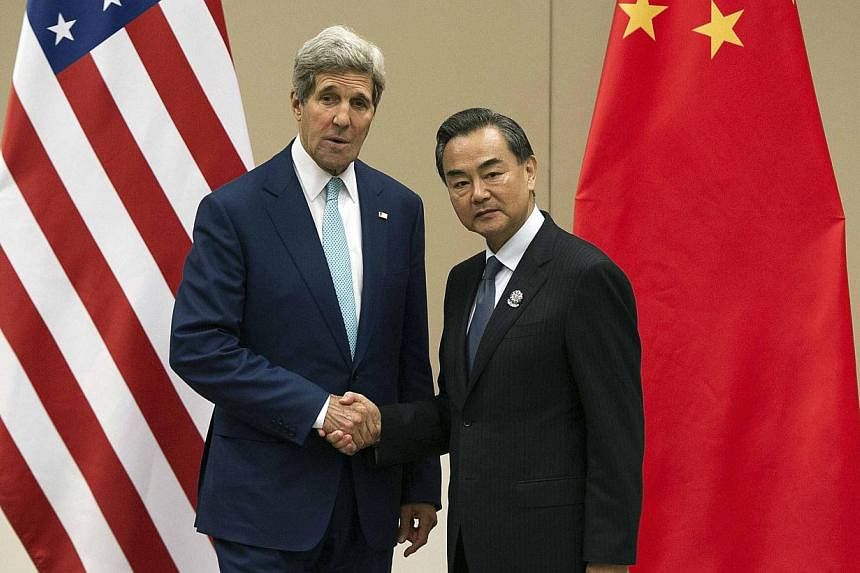BEIJING (AFP) - Beijing accused the US of deliberately stoking tensions in the South China Sea as it rejected Washington's proposal for a freeze on provocative actions in the region, the foreign ministry said Monday.
The remarks by Foreign Minister Wang Yi came at an Asean Regional Forum (ARF) overshadowed by disputes over the strategically significant sea.
Beijing claims it almost in its entirety, putting it at odds with countries including the Philippines and Vietnam, and there have been several tense encounters in the area over recent months.
US Secretary of State John Kerry appeared at the forum to push for a multilateral agreement to end all actions that risk further inflaming regional sensitivities.
But Mr Wang said: "Some countries outside the region are restless, and stir up tensions... might their intention be to create chaos in the region?
"China and Asean are totally able to safeguard well the peace and stability of South China Sea."
His comments, posted on the foreign ministry's website Monday, were aimed squarely at the US, state-run media said.
China's official Xinhua news agency headlined its report on his comments: "China rebuffs US 'freeze' proposal on South China Sea."
It said Mr Wang repeated China's long-standing rejection of multilateral talks over the sea, saying that "relevant disputes should be addressed by countries directly concerned".
In a commentary Monday, Xinhua described Washington's proposal as "counterproductive", adding: "It is simply an unconstructive idea.
"By stoking the flames, Washington is further emboldening countries like the Philippines and Vietnam to take a hardline stance against China," it said.
"It is a painful reality that Uncle Sam has left too many places in chaos after it stepped in, as what people are witnessing now in Iraq, Syria and Libya," it added.
"The South China Sea should not be the next one."
In Washington, State Department spokeswoman Marie Harf rejected Xinhua's criticism.
"We're not the ones that are fomenting instability there. It's the aggressive actions the Chinese have taken that are doing so," she said.
"Everything we are doing is designed to lower tension to get people to resolve their differences diplomatically and not through coercive or destabilising measures like we've seen the Chinese take increasingly over the past several months," she said.
At the ARF, Mr Kerry on Saturday formally put forward Washington's proposal to cool maritime tensions based on claimant states agreeing to step back from actions that could "complicate or escalate disputes".
The US has stepped up its tone on the South China Sea following a series of maritime incidents between China and rival claimants, including Beijing's positioning of an oil rig in waters also claimed by Vietnam which sparked deadly riots in the South-east Asian nation.
A senior US State Department official, declining to be named, said Monday that at the ARF long-running discussions on a code of conduct between nations in the sea had moved from "the abstraction of a long-term process" towards an "early harvest of ideas", without giving details.
But the official added that Washington would be carrying out surveillance in the area.
"We will also be monitoring the actual situation around the rocks, reefs, and shoals in the South China Sea... in order to assess whether the claimants have taken to heart the consensus... that de-escalatory steps are called for," the official said.
China's claims in the sea, which lies on key shipping routes and is said to be rich in mineral and oil deposits, also conflict with those of Brunei, Malaysia and Taiwan.

